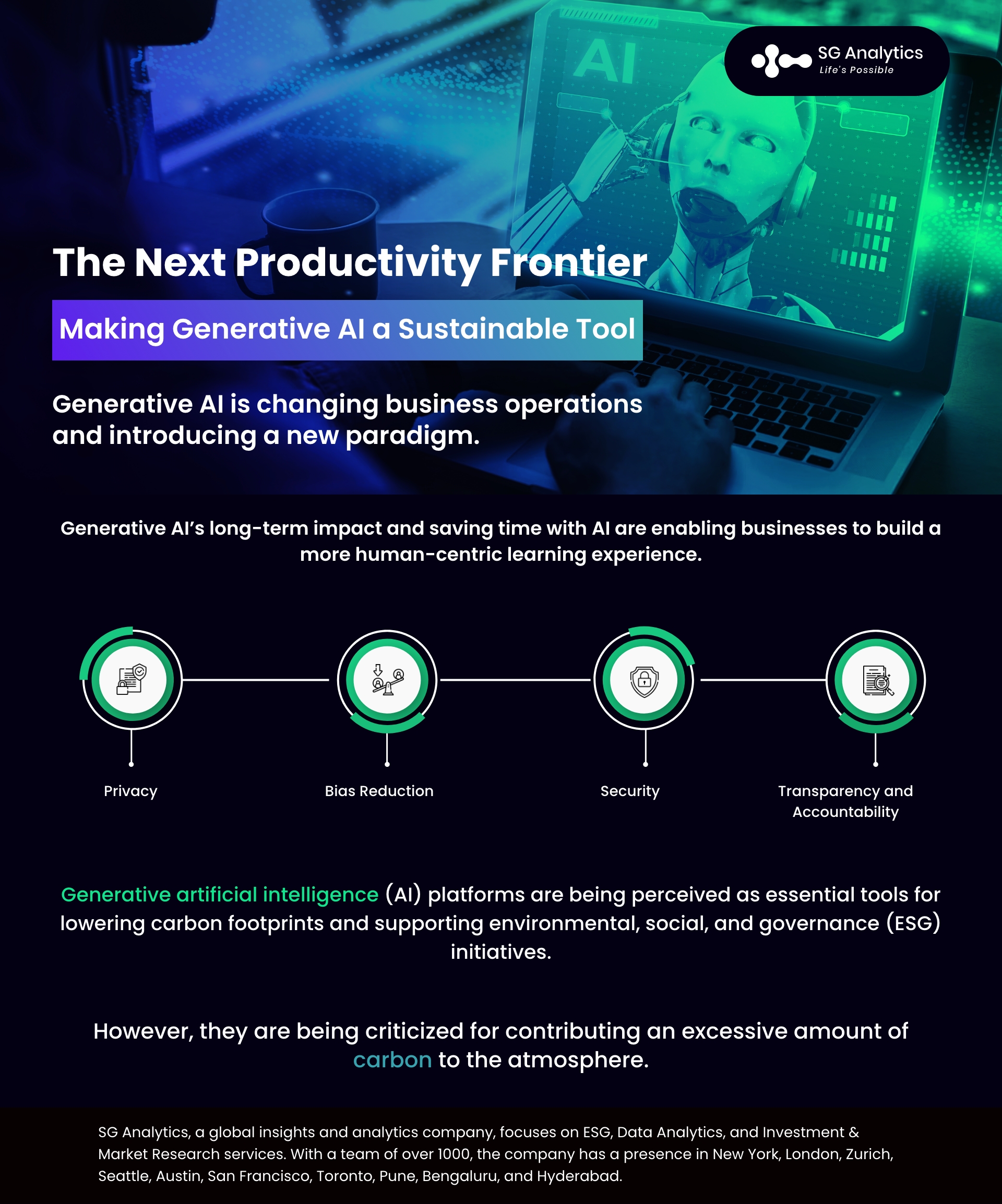Today, AI has permeated our lives incrementally. As a result, its progress has been imperceptible. Generative AI applications like ChatGPT, GitHub Copilot, and others are capturing people's imagination thanks to their broad utility. They are equipping users with a preternatural ability to communicate and create.
Utilizing generative artificial intelligence has made it possible for businesses to integrate AI in ways that were not possible with conventional assessment and evaluation technologies. Businesses are leveraging generative AI tools for sustainable value generation and fostering a green IT infrastructure.
The latest generative AI applications are assisting users to perform a range of routine tasks, like reorganization and classification of data. However, the abilities that have garnered headlines and persuaded consumers to experiment are writing text, composing music, and creating digital art. As a result, a broader set of stakeholders are exploring the impact of generative AI on business and society. And the speed at which generative AI technology develops is not making this task any easier.
Read more: A Guide to Improving Environmental Sustainability in IT Infrastructure
The Sustainability Value of Generative AI
The pace of workforce transformation is accelerating, owing to an increase in the potential for technical automation. Technological developments, economic feasibility, and diffusion timelines are estimating that half of the work activities could be automated between 2030 and 2060.
This is eventually bringing forward a new wave of designs and developments for AI-enabled learning. However, there still remains a critical requirement to investigate how generative AI tools can be employed responsibly to design, implement, and evaluate a sustainable ecosystem.

Generative artificial intelligence (AI) is pushing organizations into ethical debt on the environment in the carbon cost of its development. Yet, analysts believe that generative AI will soon not only pay that debt off but also emerge as the solution to cutting the carbon output.
It is equally vital to note that the development and use of these systems are energy-intensive, and maintaining the physical infrastructure entails power consumption. While these tools are beginning to gain mainstream traction, it is reasonable to think the costs at which they are poised to grow in the near future.
Read more: Big Tech’s Big Generative AI FOMO
Making Tools More Sustainable
Businesses are experimenting with generative AI to realize the innovative potential of this disruptive technology. In corporate learning environments, generative AI has the potential to be transformative. They are changing the way corporate learning is tailored for specific roles and embracing new AI skills to gain productivity across most parts of the business.
As businesses are successfully adapting generative AI, many harbor more existential concerns about generative AI’s potential to fundamentally alter everyday operations and disrupt human connections. Data centers are being designed to store and manage information and communications technology systems. With the volume of data required to run generative AI models, businesses are incorporating an ever-expanding sea of data servers to store the collected data. Data models with more parameters and training data consume more energy and generate more carbon.
However, large generative AI models are not alike in terms of energy and carbon emissions. Generative AI models require a ten to a hundred-fold increase in computing power to train the models. Therefore, in order to determine the carbon footprint of an ML model, businesses need to consider three distinct values:
-
the carbon footprint from training the model
-
the carbon footprint from running inference
-
the carbon footprint required to produce the computing hardware and cloud data center.
Generative AI’s long-term impact and saving time with AI are enabling businesses to build a more human-centric learning experience. To power, build, and integrate sustainable forms of generative AI, business leaders are integrating measures to preserve the essence of the educational experience.

Read more: ESG Outlook: How Tech Companies Harness Data to Reimagine Their Business
-
Privacy: Prioritizing privacy rights in the development, as well as the use of AI systems, is critical as it helps in ensuring control over critical data.
-
Bias Reduction: AI systems are designed, developed, and used to ensure they are unbiased and fair. This unfolds the issues of accessibility. AI systems need to be accountable for the need as well as understanding the accessibility of these AI tools.
-
Security: AI systems should be developed and used with a strict commitment to security. They should be tested to reduce the risk of harm and to provide reliability and security throughout the lifecycle.
-
Transparency and Accountability: AI systems should offer clear and explainable outputs. Businesses should be aware of where and how the AI systems are being used in the operational journey. Organizations and AI developers should be fully accountable for the AI systems they use.
Navigating the AI-Driven Future with a Human Approach
Maintaining a human-centric perspective is essential when it comes to implementing technology for learning. AI is another tool that enables businesses to be more productive in the tasks they are performing. This is the reason why it is important for businesses to play a critical role in shaping AI and their engagement with it.
Today, the speed at which generative AI is impacting us is surprising. The arrival and integration of generative AI feels more like an evolution but is unsettling rather than innovative. With the right principles in place, businesses can ensure that they use AI in a way that strengthens the human connection, thus enabling the next generation to achieve more than they dreamed possible.
While the era of generative AI is just beginning, the excitement over this technology is palpable and compelling. However, a full realization of the technology’s benefits will take time, and leaders need to address the considerable challenges, including managing the inherent risks in generative AI and determining the capabilities of the workforce while rethinking core business processes.
Read more: Sustainable Framework: How can Organizations Make Generative AI Green?

Final Thoughts
The impacts of generative AI’s introduction into the mainstream are being felt more immediately. Technology is changing business operations and introducing a new paradigm. Generative AI is poised to unleash the next wave of productivity for organizations, where they can discover the underlying potential and its impacts on the workforce. The key to sustainable IT, generative AI, is essential for staying competitive.
Today, generative artificial intelligence (AI) platforms are being perceived as essential tools for lowering carbon footprints and supporting environmental, social, and governance (ESG) initiatives. However, they are being criticized for contributing an excessive amount of carbon to the atmosphere.
SG Analytics, recognized by the Financial Times as one of APAC's fastest-growing firms, is a prominent insights and analytics company specializing in data-centric research and contextual analytics. Operating globally across the US, UK, Poland, Switzerland, and India, we expertly guide data from inception to transform it into invaluable insights using our knowledge-driven ecosystem, results-focused solutions, and advanced technology platform. Our distinguished clientele, including Fortune 500 giants, attests to our mastery of harnessing data with purpose, merging content and context to overcome business challenges. With our Brand Promise of "Life's Possible," we consistently deliver enduring value, ensuring the utmost client delight.
A leader in ESG Services, SG Analytics offers bespoke sustainability consulting services and research support for informed decision-making. Contact us today if you are searching for an efficient ESG (Environmental, Social, and Governance) integration and management solution provider to boost your sustainable performance.
About SG Analytics
SG Analytics is an industry-leading global insights and analytics firm providing data-centric research and contextual analytics services to its clients, including Fortune 500 companies, across BFSI, Technology, Media & Entertainment, and Healthcare sectors. Established in 2007, SG Analytics is a Great Place to Work® (GPTW) certified company and has a team of over 1100 employees and has presence across the U.S.A, the U.K., Switzerland, Canada, and India.
Apart from being recognized by reputed firms such as Analytics India Magazine, Everest Group, and ISG, SG Analytics has been recently awarded as the top ESG consultancy of the year 2022 and Idea Awards 2023 by Entrepreneur India in the “Best Use of Data” category.









